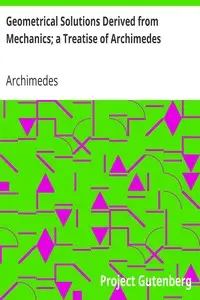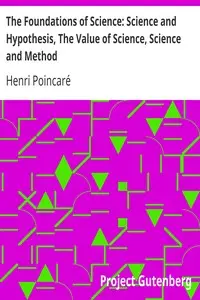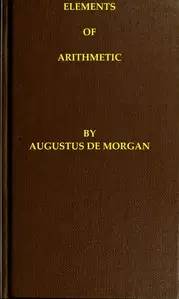"Geometrical Solutions Derived from Mechanics; a Treatise of Archimedes" is a scientific publication attributed to the ancient mathematician Archimedes, with a translation by Dr. J.L. Heiberg and an introduction by David Eugene Smith. This treatise, derived from manuscripts discovered in the early 20th century, belongs to the late classical era, specifically around the late Hellenistic period. The book primarily discusses the geometric principles relating to mechanics, presenting solutions that intertwine mathematical concepts with practical applications in physics. The content of the treatise elaborates on several key propositions by Archimedes, demonstrating how geometric solutions can be derived from mechanical principles. The work includes explorations of the volumes of various solid shapes such as cylinders, spheres, and parabolas, often relating their properties to practical mechanical applications. Archimedes emphasizes his innovative methods of deriving geometric proofs through intuitive and mechanical reasoning rather than purely analytical approaches. Each proposition builds upon a mechanical foundation, revealing the interconnectedness of geometry and mechanics and providing insights into Archimedes's thought process in discovering mathematical truths. (This is an automatically generated summary.)

Geometrical Solutions Derived from Mechanics; a Treatise of Archimedes
By Archimedes
"Geometrical Solutions Derived from Mechanics; a Treatise of Archimedes" is a scientific publication attributed to the ancient mathematician Archimede...
Archimedes of Syracuse was an Ancient Greek mathematician, physicist, engineer, astronomer, and inventor from the ancient city of Syracuse in Sicily. Although few details of his life are known, he is regarded as one of the leading scientists in classical antiquity. Considered the greatest mathematician of ancient history, and one of the greatest of all time, Archimedes anticipated modern calculus and analysis by applying the concept of the infinitely small and the method of exhaustion to derive and rigorously prove a range of geometrical theorems. These include the area of a circle, the surface area and volume of a sphere, the area of an ellipse, the area under a parabola, the volume of a segment of a paraboloid of revolution, the volume of a segment of a hyperboloid of revolution, and the area of a spiral.













